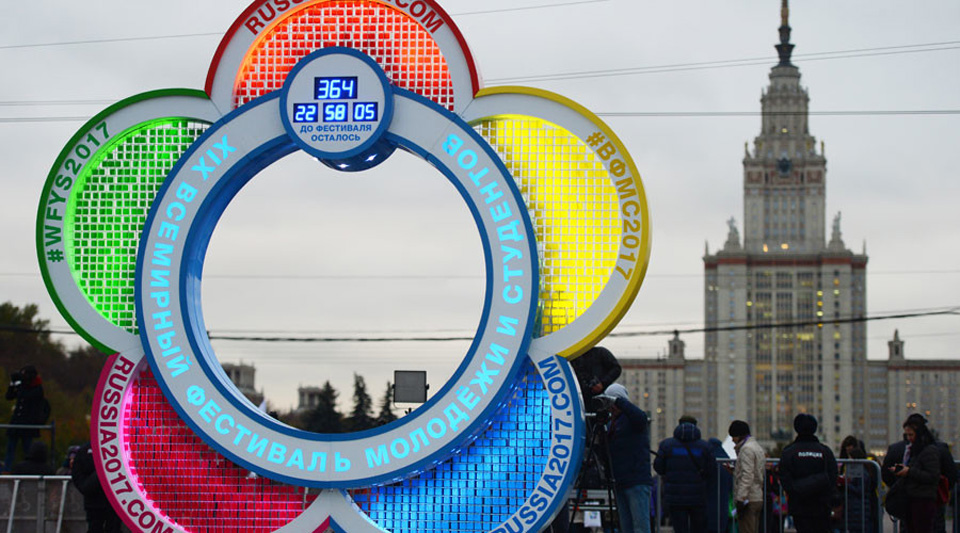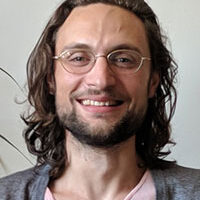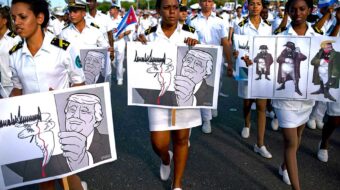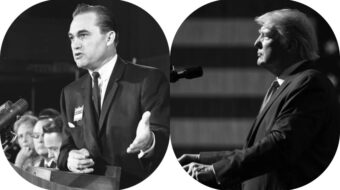
On the early morning of Thursday, Oct. 13, eight young people organized by the Communist Party USA (CPUSA) will fly to Sochi, Russia to join over 50,000 youth expected from over 183 countries for the 19th World Festival of Youth and Students (WFYS). Running from Oct. 14-22, this worldwide gathering of young leaders will engage in discussions about how to work together to solve problems of war, racism, inequality, lack of jobs and educational opportunities, and many other urgent issues.
The festival is organized by the World Federation of Democratic Youth (WFDY), which was formed in 1945 at the end of World War II to fight against fascism and secure peace. WFDY is an internationally-recognized NGO enjoying consultative status with the United Nations’ Economic and Social Council and with the U.N. Educational, Scientific, and Cultural Organization (UNESCO).
The first festival was held in Prague, Czechoslovakia, in July 1947, two years after its liberation from Nazi occupation. Throughout the years, the festival movement has defended and advanced civil and democratic rights and the rights of nations to self-determination.
Subsequent festivals have been held in cities around the world, including in Pretoria, South Africa in 2010, the homeland of Nelson Mandela, where Fidel Castro addressed the festival-goers. At the 2013 festival in Quito, Ecuador, President Rafael Correa addressed the crowd in the pouring rain, saying that “there can be no peace in the world without justice.” And in 1973, Angela Davis, fresh from her release from prison, attended the 1973 Festival in Berlin.
The 14th Festival in 1997, which took place in Havana, Cuba, was significant in showing that the flame of the Festival Movement had not gone out despite the fall of the socialist bloc countries, which had been major supporters.
This year’s festival will gather under the slogan “For peace, solidarity, and social justice, we struggle against imperialism – Honoring our past, we build the future!” The festival will also include sports and cultural events to further develop international friendship and solidarity.
Centered around the struggle against imperialism, fascism, and racism, and highlighting the role of the youth in the struggle for gender equality, the 19th Festival will honor the 100th anniversary of the Great October Socialist Revolution and the 70th anniversary of the Festival Movement. It will also honor the memory of Ernesto “Che” Guevara, Fidel Castro, and Mohamed Adelaziz, leader of the Sahrawi national liberation movement against Moroccan occupation of Western Sahara, the last remaining colony in Africa.
Preparations for the festival have been in development since the 19th General Assembly of the WFDY held in November 2015. It was held soon after the Cuban Five won their freedom and after then-U.S. President Barack Obama initiated diplomatic ties with Cuba, steps which are now being reversed by the Trump administration. That meeting involved the participation of 130 delegates representing 62 organizations and 35 countries.
Program themes for the 19th Festival were formulated in line with the U.N.’s 17 Sustainable Development Goals of the 2030 Agenda for Sustainable Development.
On October 1st, CPUSA delegates to the festival held a send-off party in New York City to involve community partners in the Festival Movement. Participating at the event were organizers and activists from the #Fightfor15, the #CLOSErikers campaign, and Black Lives Matter. The conversation was focused on the relationship between racism and imperialism, followed by musical performances.
“When you look around the world, the people who have darker skin suffer the most. Why is that?” asked one BLM activist. It’s “because of [U.S.] slavery and [U.S.] colonialism… their resources are exploited,” they said. “Racism isn’t just because people are Black and Brown, although that’s a huge part of it, but it’s also because they’re poor, so they’re vulnerable.”
#CLOSErikers organizer Vidal Guzman said that mass incarceration is another example of “not putting the right investments in the community,” and that “the people closest to the problem are the people closest to the solution.” Another BLM activist requested that the delegates go to the festival to “internationalize the movement” for racial justice in the U.S.
The festival will officially start with a parade commemorating the 100th anniversary of the Russian Revolution. Other sections of the program will contain focused discussions on primary issues facing specific regions of the world.
The third day, “America Day,” under the heading “Peace, Justice, Anti-imperialism and People’s Friendship,” features a conference on the refugee crisis affecting many areas of the world and the power of solidarity. The fourth, “Africa Day,” features a conference on “the rise of fascism and anti-communism, racism, and xenophobia.” The next day, “Middle East Day,” focuses on the struggle for free and universal access to health, education, science, culture, and information.
The sixth day, “Asia Pacific Day,” will discuss youth unemployment and the precarious sitation of young workers under conditions of capitalist crisis. Addressing issues in Europe on the seventh day, the participants are scheduled to discuss the development of science and the consequences to the environment. The eighth day, “Russia Day,” spotlights the host country and includes sessions on securing access to water and opposing its privatization. A separate seminar will focus on opposition to falsify the history of World War II and attempts to equate communism and fascism.
Additional seminars will be held each day on subjects such as how to confront precariousness and youth unemployment, the role of youth in the struggle for gender equality, climate change, food sovereignty and health, and other issues.
Throughout the festival, there will be exhibitions on the Soviet Union, the victory against Nazism in 1945, the lives of Che Guevara, Fidel Castro, and Mohamed Abdelaziz, and the 6th and 12th World Youth Festivals held in Moscow.
A “Regional House” (Casa Americas) will also be organized to engage in social issues and expressing solidarity with Puerto Rico, Venezuela, and Cuba through book presentations, videos, speakers, music, and poetry. The author of this article will be giving a looping violin performance during this component.
The festival will also feature an “Anti-Imperialist International Court,” where charges are expected be brought against imperialist forces for terrorism, economic blockades, environmental destruction, and war.
A video put out by the CPUSA delegation to the festival, explaining why they will be attending, can be viewed here.












Comments